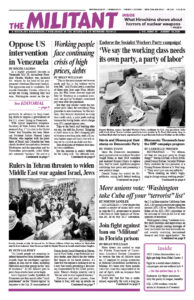Earlier this year the Militant received a letter from Javier Perdomo, one of the millions of working people caught up by the “enormous machine for grinding people up” that is the U.S. criminal “justice” system. That quote comes from Ramón Labañino, one of the five Cuban revolutionaries framed up by the FBI in 1998 for monitoring counterrevolutionary groups that operate in Florida and carry out attacks against Cuba.
Perdomo wrote about receiving the socialist newsweekly in the Florida prison where he is incarcerated. “I am grateful an issue of the paper fell into my hands. It spoke about Che, Fidel, and the working class,” he said, echoing comments the Militant receives regularly from workers behind bars.
He also told the story of his grandparents, who had worked on the land before the 1959 Cuban Revolution that overthrew the dictatorship of Fulgencio Batista and brought to power a workers and farmers government.
Perdomo’s grandfather, Paulino Perdomo Ramos, was one of 30 farm laborers at the Ácana farm in Matanzas province who Fidel Castro, a young lawyer at the time, represented in a fight for back wages.
“One day my grandfather and his co-workers woke up to darkness because the abusive big landowners — used to living off the sweat of others, by deceit and blackmail — closed their coffers and refused to pay the more than six months wages owed to them,” he wrote.
After many complaints to the authorities, and discussions with the bosses, on Dec. 27, 1952, the workers were visited by “a lawyer from Havana” offering help. “We were afraid it was a maneuver by the owner and the tenant,” Paulino Perdomo told his grandson when Javier was growing up.
“I need you to find a place where we can meet with the workers,” Castro told Javier’s grandpa. “I went to the union, and they refused to let me use the hall, and then I went to the town hall and they also refused.”
An account of the exchange is included in the book Fidel Castro: De Birán a Cinco Palmas, published in 1997 by Verde Olivo, the publishing house of Cuba’s Revolutionary Armed Forces.
“He was driving an old car, one that was even missing a door,” a piece by Paulino Perdomo quoted in the book says. Four days later, “with Fidel present, we were receiving our checks.” The workers tried to give him a few pesos for gas, to thank him, but he wouldn’t even accept that — “he had told us he was not going to charge us one cent.”
‘No revolution wins without struggle’
Castro’s intervention on behalf of the Ácana farmworkers took place at the same time he was assembling the 160 combatants who six months later — on July 26, 1953 — launched an insurrectionary attack on the Moncada army garrison in Santiago de Cuba and the Céspedes garrison in Bayamo. The action marked the beginning of the revolutionary struggle against Batista.
Well before the Moncada assault, Castro was convinced that a revolutionary transformation in Cuba was only possible through the massive outpouring of working people.
“I didn’t know his political views,” Paulino Perdomo wrote “We had never even seen his shadow.” After we received the checks Castro said that if we ever win “there will be an agrarian reform.”
“Well imagine, at that time,” Paulino Perdomo wrote, “who would have thought that it was for real.”
“We continued meeting afterward in my house to discuss the simmering hatred we had for the abusive landowners and for a change in favor of the working class,” Paulino Perdomo told his grandson.
“More than 20 minutes had passed after my grandfather cast his fishing line, and I was waiting to see if he’d catch something before throwing mine,” wrote Javier Perdomo.
“Why haven’t you thrown your hooks into the water?” Paulino Perdomo asked.
“Because your bobbers aren’t even moving and I’m getting bored,” the young Perdomo said.
“If Fidel had gotten bored before Moncada and had waited for others to make the revolution,” his grandfather replied, “we’d still be under capitalism. No revolution will triumph without a struggle, just like no hook will catch a fish if it’s not in the water.”

